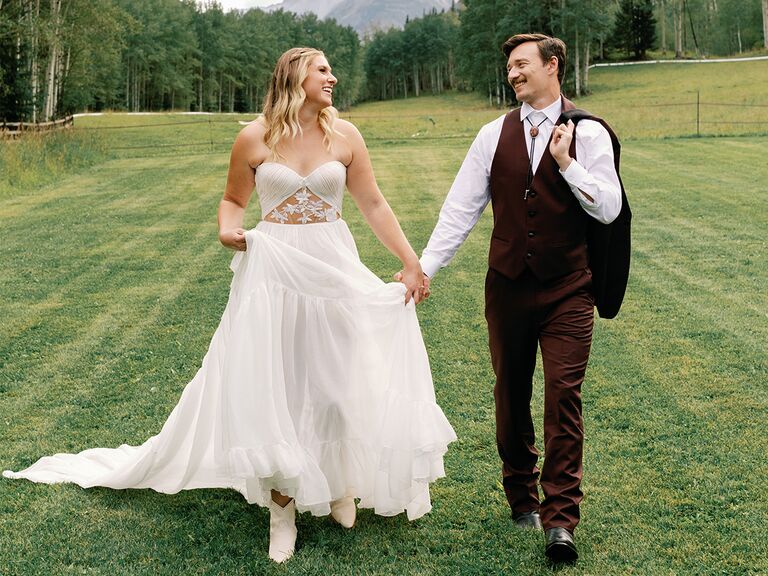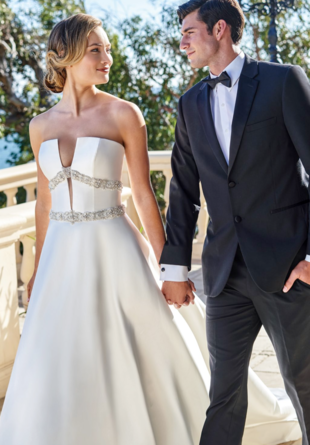Who Pays for the Wedding Dress? We Asked the Experts
In today's day and age, couples are doing things their own way when it comes to weddings—and often, they're paying for them too. And yet, the question of who pays for the wedding dress remains up in the air. It's a tradition that many brides want to keep intact: shopping with their mother and sisters or dearest friends and letting their parents chip in.
But before brides can decide who's paying, they have to set a budget. The Knot's 2024 Wedding Attire + Fashion Study found that brides budgeted an average of $1,900 for their wedding attire last year—and about 52% of them stuck to it. (The average cost of ceremony attire for brides rang in at $2,000).
Melissa Russell and Natalie Bauer work with brides—and budgets—every day. They're the owners of Bella Bianca Bridal Couture, a luxe bridal boutique in Chicago that carries the likes of Anne Barge, Galia Lahav and Pnina Tornai. (The sister duo also own a Bella Bianca outpost in suburban Oak Brook, an off-the-rack bridal shop and a Bella Bridesmaids location.) "Setting the budget for the gown is a very personal situation, and there is no right or wrong way to approach it," Russell says, adding that there's also no right or wrong about who should pay for the wedding dress. "From our perspective, the gown budget should not be tied to the overall budget and should instead be tied to the aesthetic and quality that the bride deems important."
Fear not, they add: "There are beautiful dresses at every price point, so our advice is to be honest about what is important to you and focus your shopping in that area." They highly advise establishing the budget long before starting to shop, and making sure whoever is paying is on the same page; it will result in a far more enjoyable shopping experience. Here, they weigh in on who typically pays.
In this article:
- Who Pays for the Wedding Dress?
- Who Sets the Wedding Dress Budget?
- If Someone Else is Paying for the Wedding Dress, Do They Get to Choose It?
Who Pays for the Wedding Dress?
Though The Knot 2024 Wedding Attire + Fashion Study found that roughly half of brides are paying for their ceremony attire, Bauer and Russell say their salon tells a different story, with only about 10% of their brides covering the cost in full (and often, who pays for the bride's dress is a combination of people, which could account for the difference). Here, they break down who usually pays and how it affects the experience.
Parents or In-Laws
"The majority of the time, the bride's parents are covering the cost of the gown," Bauer says. "There are certain cultures where the tradition is for the groom's family to pay for the bride's gown, in which case they are typically involved in the shopping process as well." However, this doesn't necessarily mean the budget is higher, as might be expected. "The stereotype that brides are frivolous with their parents' money during gown shopping could not be further from what we find the norm at our salons," Russell adds. "More often than not, the brides are hoping to find a gown below the budget that their parents have set because they feel guilty about the cost. So many times, the parents are pulling our stylists aside and encouraging them to pull higher price point gowns even when the bride isn't asking for them."
The Person Wearing the Wedding Dress
"We estimate that less than 10% of our brides are paying for their dress entirely on their own; however, about 20% pay for a portion of the total cost," Bauer says. "While brides who have family paying for the gown tend to want the budget to be lower, we find that brides paying for their own gown are unapologetically setting high budgets. These brides are happy to spend their hard-earned money on something that makes them feel so beautiful. It is always easier to justify spending more of your own money than someone else's!"
The Couple Together
Bauer and Russell say it is very rare for the groom to pay for the gown entirely on his own—however, often, the couple pays together. "Especially in our city location, we see many couples who are paying for the gown together," Russell says, noting that this doesn't mean the groom has to come shopping. "We have actually seen a decreasing number of grooms in the salon shopping with their fiancés. This was more common 10 years ago, but now we seem to have gone back to a more traditional period of the groom not seeing the gown prior to the wedding." This payment situation is when the duo sees brides sticking to their budget the most. "When brides are splitting the cost with the groom, they tend to be very diligent about the budget that they set together as a couple. Since these couples tend to be also paying for the whole or majority of the wedding, they are normally on the same page as to what their comfort zone is price-wise."



A Combination of People
Sometimes, it's a little bit of everything. After all, "for most people, their gown budget is more than they have ever spent on a garment before," Bauer says. "It is quite common to see the cost being split across the bride and her parents or with her groom. We are fortunate to work with families many times as each daughter gets engaged, and often, the parents will set a standard amount that they are willing to contribute. This allows each daughter to choose if she would like to stay within that amount or broaden her price range, knowing she must make up the difference in cost on her own."
Who Sets the Wedding Dress Budget?
The question isn't so much about who sets the budget as much as when. "The budget should definitely be set prior to shopping and should be dictated by the person or people paying for the gown," Russell advises. "The worst situation is when the budget is not truly solidified with the person paying until after the bride has already fallen in love with a gown, only to realize it is not feasible financially." She and Bauer recommend having all involved parties sit down together before shopping to decide who is willing to contribute and how much. With a little research, you can find salons that specialize within the price range you're shopping. "It is never a good idea to try on gowns outside of your budget 'just for fun,'" Bauer emphasizes. "It only leads to two things: Spending more than you were comfortable with, or feeling like everything you try on after that is 'less than.'"
If Someone Else is Paying for the Wedding Dress, Do They Get to Choose It?
"No matter who is paying for the gown, the bride is the only one who should get to decide what makes her feel beautiful," Bauer says. She and Russell admit they've seen mother-daughter showdowns between a bride who loves a gown and a mother who refuses to pay for it, but say that this is definitely not the norm. The key to wedding dress shopping—and to relationships in general, as it turns out—is communication. "Having an honest conversation with those offering to contribute is important so that no one feels offended at the end of the experience," Russell says. "If the bride is concerned that she and her mother don't have the same style and therefore may not align in the dress choice, then the bride should elect to contribute or pay for her own gown so she is less likely to give in to the opinion of others." Be cognizant of who you bring to dress shopping appointments and how vocal they will be. "We remain Team Bride at all times, but this proves to be a difficult task when the bride bends to the opinion of her mother or entourage," Bauer says. "The key to being a beautiful bride is being happy and confident. Go with the gown that you can't wait to put on that day, not the one that makes someone else happy."
Ready to shop for your dream gown? Use The Knot Marketplace to find bridal shops near you to start trying on dresses.

























